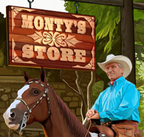I would love to see a lesson from Monty on how to handle a youngster who nips and chews on everything in sight! I work with my yearling colt in a Dually, but he is constantly reaching to chew on the lead rope, or reaching over to nip at my hand. I would love to learn how to correct this without creating a head shy horse.
Rewards
Subscribe to Equus Online University and become a part of Monty's worldwide mission to leave the world a better place for horses and for people too.
Students automatically gain access to special rewards, such as exclusive discounts at the Monty Roberts Online Shop. Visit Monty Roberts Online Shop.




Hi Paulaclaire - Monty's technique to deal with this problem is to GENTLY tap the horse on the lower leg with your toe as it is about to nip therefore distracting it and preventing the bite. Hope this helps. Cheers Jan
If tapping the leg does not work, find something that annoys him (NOT HURT HIM). Beamer used to do this. Whenever he would reach to nip me, I touched his flank just enough that he would twitch it.
All youngster nibble/bite - colts especially (Note: I am aware that in US colt is a term used for all young horse, in the UK a Colt is an ungelded male young horse, a female is a filly. Agree with above, would add that a plastic bag in your hand that you can "crackle" when he comes to close is useful (but be careful, dont want to overspook him!) but most importantly keep him well away from you; he shouldn't be hear enough to bite your hand :-) The good news is they do grow out of it with consistent training and if not breeding from him, castrate as soon as possilbe !
I must speak on the castrate as soon as possible. Just because breeding is not in his future does not necessarily mean he should be fixed, especially if the facilities you are at can keep him separate from the mares and still give him some company. If you work with him in a respectful way, I do not think you will have any problems.
And I must ask, why keep him far enough away from you that he cannot reach you? If you establish that you are a dependable and respectable leader, why not have him close to you? Since establishing a much better relationship with Beamer, I have no problems at all letting him be as close as he wants.
Hi Soul
You're right to pull me up :-) I wrote that note too quickly and didn't explain myself properly, apologies!
Ok, Re: keeping him away: I meant while he is in his nipping phase and as part of his training i.e. don't give him the opportunity to take a nifty bite so that it doesn't become a battle because a bite hurts and we inevitably react which can make it worse! I certainly do not advocate keeping horses away from us, but, as Paul mentions in a previous post I do expect the horse and me to respect each others 'space bubble' and if he can't be near me without biting then he has to be away from me. Some horse are more claustropobic than others and hate being too close/fussed over so it is a mutual thing, we must not niggle at them either: I see many people fussing horses mouths and lips and some horse find it very annoying (I dont blame them!)
2. Re: stallions,of course you are right and Jans horses' grandson, Acheron, is a beautiful example of a stallion that can compete and breed etc. I attended a talk recently where they were explaining that in some countries where horses still work (e.g. Romania) they cannot afford the 'luxury' of castration: the horse has to breed and work and log and cart pull alongside mares. But you make the point: it is only IF you have the facilites, knowledge and time to bring them to this level. I am in the UK and can tell you that a lot of stallions spend all their time boxed up and just brought out to serve mares, its not a fair life for them. Thre are also plenty of horror stories of stallions out in field who have caught the scent of a marie in season and will stop at nothing to get there - a danger to all. Equally, because of the fear people have of stallions, they are often treated much more harshly by trainers, thus destroying their natural spirits; stallions are not for amateurs, I can't remember whether its Monty or Kelly Marks that tells the story of stallions being such masters of body langauge that a stallion, while its human attmepted Join Up was seen to be in the centre of the pen driving the human round the outside - who's training who?! ;-) Many livery yards in the UK will not accept stallions and a LOT of people here rely on livery yards to keep their horses. So, all in all, by all means keep him entire but it really must be thought through and we must be very sure we can still give them the life they deserve.
that should say mare in season not marie - dont know who the hell marie is haha
Hey Vicci - I am guessing Marie is a little nervous about now lol. Re the stallion issue - having been an owner and trainer of stallions I agree that they often draw the short straw as people are quite nervous around them, expecting the worst. They can be trained like any other horse and do need consistency as all other horses do. I had my stallion by myself so he had to learn that when it was time to cover mares that he had to work by voice command from me as I was at the mare's head. He was amazing and would tease and serve on command - it didn't happen overnight but with training and repetition he did learn what was required of him. He floated with mares and geldings and would even call me at night if a mare was foaling and I was a little late doing my routine checks. He did not live his life in a stable but did have a paddock to run and play in as well. As I have mentioned before he did trail riding a few days a week, he taught youngsters to ride, he herded cattle and sheep on the farm, he did all facets of competition and was a well balanced horse because of it. When I got him he had been sat on only but not educated under saddle at all and was a rowdy 7 year old boy but with patience he learnt that life was easier for both of us if we just did things without fuss. Hope this info helps anyone thinking of keeping a horse entire. Cheers Jan
That all makes sense now. I agree that stallions are not for amateurs, and that if castration protects them from a life of (pardon my American English) hell, then it is definitely the lesser of 2 evils.
Well Soul, castration done at an early age is not very traumatic on the young fella's but leaving a stallion entire that is not to be used for breeding and with people who do not understand them is really quite irresponsible in my opinion - for what it is worth. There are generally too many stallions out there breeding anyway - and a glut of horses just means in the end more animals end up in a slaughterhouse - not where we want them. Deciding to keep a stallion to breed from is not a decision that should be taken lightly and the horse needs to be of a high standard for his breed to be kept entire. I think most breed societies would agree that there are too many young horses kept as colts that will not add anything beneficial to the breed standards - but there again it is just my opinion. Also if you don't understand stallions then not a good idea to take one on unless you gain some experience in handling and training. Cheers Jan
I agree that only the best should remain as stallions otherwise their bad traits are passed on to the offspring & in my opinion, you want to breed UP, not down, if you get my meaning.
There's nothing to gain for the stallion by leaving him entire if he's not used for breeding or a high level of competition & breeding except frustration, him aim in life is to cover mares. Is it not better that he has a happy life?
Hi I just wish to add that having had issues with my youngster who is now 4yo biting I found an article which really helped me this week. Check out the ASPCA web site. see following link.
http://www.aspca.org/Pet-care/virtual-pet-behaviorist/horse-articles/horses-who-are-sensitive-to-handling
Recently working with my boy he started nipping again, although he had gotten much better than he was when I first got his as a 2yo. I would either tug the halter and say no, or square up, look him in the eye and get him to back off,or ask him to back up quite strongly off the halter, depending on where we were or how aggressive he was about it. In a matter of days this behavior started to escalate so much it started to become quite frightening! I reserched on line a few days ago as I became really worried about this. I found a lot of clips and articles I didn't like on youtube, in which they recommend anything from hitting on the nose feeding from the hand when he is being good. The article on the ASPCA site clicked with me straight away and I put it into practice. Particularly the principle of ignoring the unwanted behavior, obviously while staying out of harms way, not reacting at all, and then catching and rewarding the good behavior as soon as it happens. In the same amount of time (the last 3 days) the behavior has lessened to almost invisible! It was the right advice exactly for my particular horse. Phew! I was so relieved. The site certainly offers sound advice. Best of luck!
P.S I took the advice minus the giving treats for good behavior, as I prefer to stay away from that, especially with a biting issue. A simple rub on the wither and verbal praise works as well.